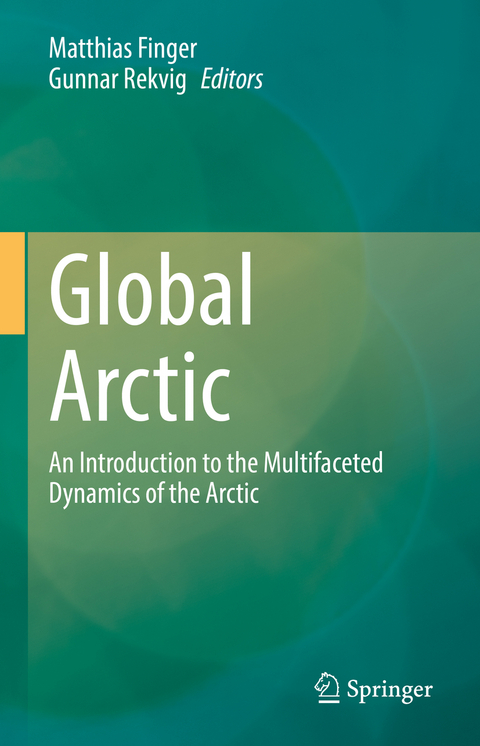
Global Arctic
Springer International Publishing (Verlag)
978-3-030-81252-2 (ISBN)
The heating of the Arctic is however also having negative impacts.
The Arctic has become a global arena. This development can only be comprehensively understood from a transdisciplinary perspective encompassing ecological, cultural, societal, economic, industrial, geopolitical, and security considerations. This book offers thorough explanations of Arctic developments and challenges. Global warming is in large part the driving force behind the transformation of the Arctic by making access possible to the areas previously out of reach for mining and shipping. An all-year ice-free Arctic Ocean, a reality possible as soon as perhaps 2030, creates a new dynamic in the North. The retreating ice edge enables the exploitation of previously inaccessible resources such as hydrocarbon deposits and rare metals, as well as the shortest sea route from Asia to Europe. Consequently, the Northern Sea Route (NSR) promises faster and cheaper shipping. Russia, along side foreign investment, especially from China, is financing the needed infrastructure.
A warming Arctic, however, also has negative impacts. The Arctic is home to fragile ecosystems that are already showing signs of deteriorating. The Arctic has seen unprecedented wildfires, which, together with the release of trapped methane from the disappearing permafrost, will, in turn, accelerate global warming. A warmer Arctic Ocean will also negatively impact fisheries. Couple this with other global changes, such as ocean acidification and modified ocean currents, and the global outlook is bleak. Additionally, the security situation in the Arctic is worsening. After the 2014 Ukraine crisis, the West imposed sanctions on the Russian Federation, which have revived the divisions of the Cold War. The reemergence of these postures is threatening the highly successful Barents Cooperation and other initiatives for peace in the circumpolar North. This book offers new insights and presents arguments for how to mitigate the challenges the Arctic is facing today.
Matthias Finger is a Professor Emeritus from Ecole Polytechnique Federale in Lausanne, Switzerland (EPFL), a part-time professor at the European University Institute (EUI) in Florence, Italy, a full professor at Istanbul Technical University (ITUE) and a research professor at Northern Arctic Federal University (NaRFU), Arkhangelsk, Russia. Gunnar Rekvig is an Associate Professor at UiT the Arctic University of Norway (UiT), Norway, and the 2019-2021 Nansen Professor at the University of Akureyri (UNAK), Iceland. He was an Assistant Professor at Tokyo University of Foreign Studies (TUFS), Tokyo, Japan (2018-2019).
Chapter 1. Introduction (Matthias Finger and Gunnar Rekvig).- Part I: Evolving images and perceptions.- Chapter 2. Indigenous peoples of the Circumpolar North (Yvon Csonka).- Chapter 3. Arctic cities - pioneers of industrialization: More than "mining towns" (Nadezhda Zamyatina).- Chapter 4. Arctic as a new strategic region in the Soviet Union in the 1920s-1930s and transformation of the Arctic science (Alexander Saburov).- Chapter 5. Norway in the Cold War - a contemporary case for today (Lars Saunes).- Chapter 6. The Post-Cold War Arctic (Lassi Heininen).- Chapter 7. The Arctic as the last frontier: tourism (Edward H. Huijbens).- Chapter 8. A Primary Node of the Global Economy: China and the Arctic (Liisa Kauppila).- Part II: Geography, environment, and climate.- Chapter 9. Climate effects of other pollutants - Short-Lived Climate Forcers and the Arctic (Kaarle Kupiainen, Mark Flanner and Sabine Eckhardt).- Chapter 10. Permafrost and climate feedbacks (Benjamin W. Abbott).- Chapter 11. Impacts of global warming on Arctic biota (Mathilde Le Moullec and Morgan Lizabeth Bender).- Chapter 12. Pollution and monitoring in the Arctic (Tatiana Sorokina).- Part III: Economics and geopolitics.- Chapter 13. The quest for the ultimate resources: oil, gas, and coal (Andrey Krivorotov).- Chapter 14. Arctic fisheries in a changing climate (Franz Mueter).- Chapter 15. Infrastructure projects in the global Arctic (Alexander Pelyasov).- Chapter 16. New trade routes (Mariia Kobzeva).- Chapter 17. The Arctic and unsustainable Development (Matthias Finger).- Part IV: Governance.- Chapter 18. Between Resource Frontier and Self-Determination: Colonial and Postcolonial Developments in the Arctic (Peter Schweitzer).- Chapter 19. Understanding Cold War Trust-Building Between Norway and the Soviet Union (Gunnar Rekvig).- Chapter 20. Regional Governance: The Case of the Barents Region (Florian Vidal).- Chapter 21. The Arctic Council at 25: Incremental building of a more ambitious inter-governmental forum (Timo Koivurova and Malgorzata Smieszek).- Chapter 22. The European Union and Arctic Security Governance (Andreas Raspotnik).- Chapter 23. Global Conventions and Regional Cooperation: The Multifaceted Dynamics of Arctic Governance (Cécile Pélaudeix and Christoph Humrich).- Chapter 24. Arctic Order(s) under Sino-American bi-polarity (Rasmus Bertelsen).- Index.
| Erscheinungsdatum | 28.02.2022 |
|---|---|
| Zusatzinfo | XXI, 486 p. 1 illus. |
| Verlagsort | Cham |
| Sprache | englisch |
| Maße | 155 x 235 mm |
| Gewicht | 968 g |
| Themenwelt | Naturwissenschaften ► Geowissenschaften ► Geografie / Kartografie |
| Naturwissenschaften ► Geowissenschaften ► Geologie | |
| Schlagworte | Anthropocene • Arctic geopolitics • Climate change impacts and affects • Earth system dynamics • Environmental impact • Governance of the Arctic • natural resources |
| ISBN-10 | 3-030-81252-9 / 3030812529 |
| ISBN-13 | 978-3-030-81252-2 / 9783030812522 |
| Zustand | Neuware |
| Haben Sie eine Frage zum Produkt? |
aus dem Bereich


